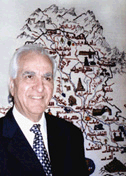Tourism Safety
New strategic travel plan to provide safety
The obvious factors that affect tourism in any country are infectious diseases and viruses such as Mad Cow disease, Bird Flu and others. Lack of security and the fear of terrorism lead to economic paralysis in many tourist companies. We see that governments rush to fight these dangers but there are other everyday dangers that go unnoticed, namely traffic problems that kill hundreds of people. There are many causalities every day and every hour. It has become a routine matter and a symptom of contemporary civilisation that no body pays attention to it. Governments gave up on this matter and they don’t know how to stop the carnage on the roads. The matter becomes worse in third world countries where the population doubles every decade and the streets are crowded with cars, motorcycles, and bicycles. Even passengers and tourists are not safe.
Saudi Arabia announced on September 20th, 2004 that it has formed a special administration to look into traffic problems and propose solutions. The figures for traffic accidents indicate that there were more than thirty thousand causalities last year. This is happening despite the large investment in roads by the Saudi government and the use of the most modern ways of controlling traffic.
I recently visited both Iran and Morocco, and before that Syria, Lebanon and Jordan. But every time I took a ride in a taxi or a friend’s car I was terrified because of the dangers involved in traffic movement. I don’t know if this is just my experience after some fifty years spent touring European cities and the Arab world and observing so many different traffic rules and behaviours. Or maybe it is caused by the lack of respect for the rules by our contemporary drivers.
Governments have invested heavily in road building and traffic control to reduce causalites but this expansion resulted in an increase in traffic accidents rather than reducing them. The increase was an attempt to contain the rise in the number of vehicles and to cope with traffic jams but did not aim at changing behaviour and creating respect for the rules and regulations of driving.
What is the solution?
The developed countries invested in the underground, trams and buses which were given priority during the rush hour. There are also special lanes for bicycles and special buses for different purposes, such as buses for tourism, students, the elderly and others.
These measures reduced traffic accidents considerably. There are ten times more accidents in the Third World than in the west even though in Germany there is no speed limit.
Bicycle highways
Are there no other solutions? I don’t think so. I have a few ideas that might reduce accidents. Some of these ideas are revolutionary and need large investments and revolutionary action, especially in rich countries. I have a suggestion to increase the capacity of the roads with a high standard of safety. The solution is to separate the different intermingled traffic types which cause accidents. Twenty years ago I developed this idea, constructed a model and presented it to the then UK transport minister, through a lawyer friend. It was welcomed by the minister but I was busy with other ideas which sometimes caused me problems and was discouraged by some people. The idea died at birth.
In summary I suggested making hung bridges for bicycles on concrete columns (flyovers) with just enough strength to take the bicycles weight and their riders with stopping stations and lifts. They should also be provided with parking spaces and chains to secure the bicycles, which can be hired from bicycle hire shops. The inside of the flyovers should be used for traffic signs or street lights and traffic lights.
There could be another layer for motorcycles, so that the street is split up into different levels with different kinds of vehicles. The street could have different lanes, one for buses and taxis, two lanes for private and other cars, two or three lanes for motorcycles, higher than the street level with slip roads and bicycle lanes suspended in the middle of the road. The pavements and slip roads should be cleared to make it easy for pedestrians to walk. The widespread use of bicycles would be beneficial on health grounds. It is also environmentally friendly, saves time etc
The street names should be clearly displayed in a uniform way, at the entrances to the side streets referring to the names of both the main street and the side street. This system is used in Germany, but unfortunately not in UK, and it causes less hustle in looking for a particular street. This eases the pressure on drivers and ensures the traffic is not slowed down.
In 1959 I was living in Frankfurt and had a volkswagen. I always needed more room to watch the front when joining the main road from the alleyway. My left side vision was blocked by a car which stopped next to the exit. I was too slow and careful but a cyclist bumped into the front of the car and I did not see him. He wasn’t hurt but he called the police. They told me he was trying to capitalise on the accident.
A week later I was notified by post of a request to come to the police station to see the sergeant. When I went, I found a person sitting at a table and he welcomed me by saying “Hello Mr. Shakiry”. After sitting down he asked me if I could answer a few questions. He said I was free not to answer and the matter would be decided by the court. He fired his questions and I answered them all. Finally, he asked me to describe the accident and after questioning me he asked me to make a report about it and add suggestions for avoiding similar accidents in future. He told me that this is not for the court but for the office which looks into all traffic accidents and plans how to avoid them in future. I told him that I can’t write in German and he replied that I can write in any language I know well. I wrote a report in Arabic. The meeting took about an hour, it was friendly and I was later asked to pay a very small fine.
I mention the details of this accident as an example of what should be done and the need to analyse traffic accidents by specialised committees so as to come out with solutions to these painful accidents.
My wife has recently completed her driving test in its two parts, theory and practice.
She passed the first part after reading the highway code. As for the second part, she passed after four attempts. After passing the exam, she started to give me advice and criticism regarding the strict rules when she is with me in the car, especially the new rules I don’t know about or follow instinctively. My fifty years driving experience in both developed and developing countries has not spared me from her criticism and I think I should sit the theory exam.
Likewise government should force drivers, especially the young ones, to take the theory exam every three years to remind them of the traffic rules, so that their practical skills will go in tandem with their moral commitments and with new developments in traffic and safety laws.
Isn’t prevention better than treatment? And isn’t precaution a safe guard against fate?
“And say: “Work soon will Allah observe your work and his apostle and believers.”
May God guide us to the best of deeds.
|

